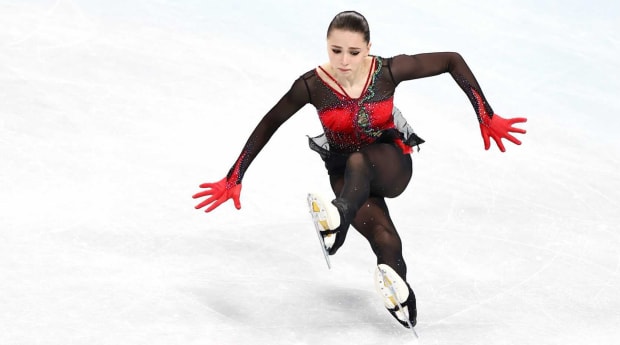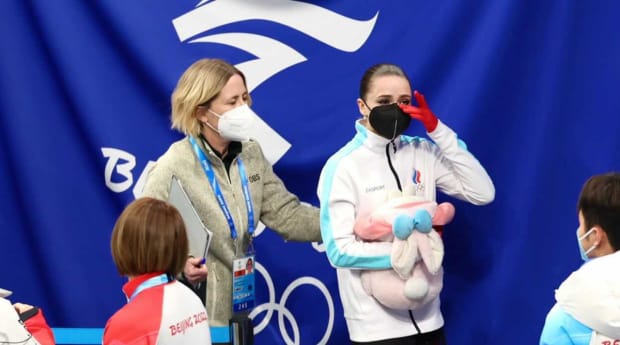Authorities deemed the 15-year-old a “protected person” who is not responsible for her actions. But no one protected her, or her teammates, from an abusive system that resulted in a doping scandal.
BEIJING — And finally, after the worst week of her life culminated in the worst performance of her life, after she became the face of a problem she did not cause, after an eye chart’s worth of international organizations took her to court, after every adult around her failed her, the teenager listened, weeping, as her coach yelled at her.
“Why did you let it go?” Eteri Tutberidze demanded. “Explain it to me—why? Why did you stop fighting? You let it go after that axel. Why?”
Kamila Valieva did not answer.
Cameras caught the exchange. Cameras have followed Valieva everywhere they could for the last nine days, since it emerged that a drug test she took on Christmas came back positive for a banned heart medication called trimetazidine. The Russian Anti-Doping Agency suspended her, then unsuspended her. The International Olympic Committee, the World Anti-Doping Agency and the International Skating Union appealed the decision. In its press release announcing it would allow her to compete, the Court of Arbitration for Sport said that barring her would constitute “irreparable harm.” What, then, was this?

Simon Bruty/Sports Illustrated
Valieva is perhaps the most talented figure skater the world has ever known. She is also a 15-year-old high-schooler who carries around a stuffed rabbit and dreams of earning her driver’s license. This week, as WADA deemed her a “protected person” who is not responsible for her actions, no one protected her.
She had been heavily favored to win gold in the individual competition after helping Russia to gold in the team event. She broke down crying at practice this week, faltered in her short program Tuesday and finally collapsed under the weight of it all Thursday, falling on two jumps and stepping out of two others. She finished fourth, with 224.09 points, more than nine points out of the medals; her free skate score of 141.93 was her worst in more than two years.
It all worked out O.K. for Russia, which is currently serving an imaginary punishment for a state-sponsored doping scheme aimed at winning Olympic medals: Valieva’s 17-year-old teammates, Anna Shcherbakova and Alexandra Trusova, won gold and silver, respectively.

Simon Bruty/Sports Illustrated
Cameras caught their reactions, too: Shcherbakova sat, stunned and alone, while Trusova sobbed because she believed that her five successful quadruple jumps—the same number that men’s champion Nathan Chen landed—should have won. “I hate this sport!” she wailed. “Everyone has a gold medal, everyone! But I don’t!” Both girls—and they are girls, not women—took the podium with red, puffy eyes. Neither would commit to continuing to skate.
A Russian spokesperson declined to make Tutberidze, who coaches all three, available for an interview. Shcherbakova and Trusova declined to comment on Valieva. Valieva did not speak to the media. But the scene said enough.
It was a horrible yet perfect cap to a grotesque Olympics: held amid a pandemic, hosted by a country sending its citizens to concentration camps. Despite it all, the athletes nearly managed to redeem the whole thing. But anyone who watched Thursday’s child abuse, broadcast live, should feel sick.
Valieva reportedly also had two other, legal heart medications in her system, neither of which could have been accidental, as she listed them on a doping control form. That combination is unusual in a teenager and poses questions far more important than WADA can answer.
In the meantime, a collection of adults sent a child to suffer in public, and suffer she did. She spent much of the week yanking her hood over her head as she trudged past journalists who had camped out outside her practices to ask whether she is a drug cheat. Her peers achieved their dreams, then answered questions about her. If anyone gave her a hug, they did not do it in public.

Simon Bruty/Sports Illustrated
So many people could have ended this: her mother, who reportedly testified on her behalf; her grandfather, who reportedly said she had somehow ingested his heart medication; Tutberidze; the Russian Olympic Committee; any of those other agencies. Instead the IOC announced that it would not hold a medal ceremony if she made the podium. What a relief it must have been for those officials that she fell down.
As she awaited a score that she did not want to see, she slumped between Tutberidze and her choreographer, Daniil Gleikhengauz. Valieva’s mask did little to hide her anguish. When the result was final, she crumpled. She sat there, sobbing quietly, for a few minutes. Eventually she hauled herself up. She hustled past the media, clutching her stuffed rabbit and staring straight ahead. Fortunately, her Olympics are over. Unfortunately, now she has to go home.
More Olympics Coverage:
• It's Time to Raise the Minimum Age in Figure Skating
• Women's Figure Skating Marred by Valieva's Controversial Return
• Aerial Skiers Must Overcome Surprising Fear of Heights to Win Big